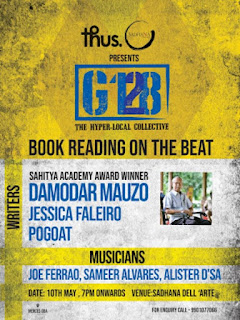Stories Set to Music
There is a new trend in the literary world in Goa: one that promises to set your foot tapping while listening to engrossing tales. That’s right – we are to be entertained by musical book readings. The author of Fair-Weather Brother, Pogoat, has already dipped his toes into this new experience at 6 Assagao with much success.
Pogoat tells us that combining music with book readings is not an invention of the 21st century, beginning somewhere in the 1950s with great credit to the efforts of Jack Kerouac, American novelist, poet, and leader of the Beat Generation literary movement. Pogoat says, ‘Book readings with music go back a very long way, back into the 1950’s when the blues and jazz scene began to explode in America and the beat writers mixed it all up with prose and poetry. But the writer who took the art of musical reading to the mainstream media was Jack Kerouac. Jack claimed to know jazz more than any other writer, and his book readings with jazz music were culture defining moments. A historic event in literature, so says the New York Times.’
On a mission to rejuvenate and pay homage to the Beat movement, Pogoat approached Nilankur Das who is the founder of Thus., a social platform that nurtures an environment of social activism and change, and organises events to encourage critical thinking for the same at 6 Assagao. Nilankur had some experience in the area having held musical book readings: poems and spoken verse usually with a single instrument such as guitar, flute and so on. He was excited at the prospect of a book reading despite the challenges it presented like the curation of the text.
‘It was my idea to use emotive text from a novel and condense the narrative to a particular incident, introduction of a character and just a fleeting moment or feeling that would directly connect with the audience. The music bridges the emotions, and we have an act from the novel; a performance that might be captured in video, however it can never be entirely replicated,’ says Pogoat.
Musical book readings do work to make the reading more appealing to the audience. It is, perhaps, a significant way of re-introducing people to the allure of books and getting them off social media, which is playing an insidious role in dumbing down the population. Pogoat says, ‘The world would be a better place if we improved our reading. And, let’s be honest, reading is a laborious task compared to Facebook, YouTube, Instagram, etc. This is a movement to introduce stories within the book, get the audience a glimpse of the world within those pages. The music carries the audience from one narrative to the other.’
The audience response thus far has been encouraging. The single greatest reason to draw people to this style of reading is the monotony of the standard type of book reading. ‘Authors and readers are quite tired of the regular book reading sit-down sermon. The author usually appears as preacher, activist or someone trying very hard to hold the audience’s attention. A musical book reading draws people who used to read a lot and even non-readers,’ says Pogoat. While some people may come solely for the music and some for the book reading, they most assuredly are surprised by a sensory encounter that defies the norm as they witness a unique new form or art that can never be replicated in quite the same manner.
The choice of the music used in the musical book reading depends on the book and the story. There is a preference for the author to communicate their favoured music or music they find inspiring. The musicians improvise their performance based on the indications of the authors. Pogoat says, ‘In time, we want to encourage hyperlocal instruments like the Goan ghumott and other such instruments as stand-alone music or even harmonise them with synthesisers.
You can catch the next musical book reading on the 10th of May 2019, 7pm onwards. The writers include Sahitya Academy Award winner Damodar Mauzo presenting Karmelin in its original language of Konkani; Jessica Faleiro presenting Afterlife Ghost Stories from Goa; and Pogoat presenting Fair-Weather Brother. Musicians Joe Ferrao, Sameer Alvares and Alister D'Sa will be contributing their melodious tones to the event. Pogoat says, ‘The venue is Sadhana Dell ‘Arte, a beautiful, restored Portuguese mansion that’s 10 minutes from Panaji. The main hall is bathed in ample sunlight with colonial arches and a vaulted ceiling, making it the perfect place to showcase the event.’
(Originally published in May 2019)





Comments
Post a Comment